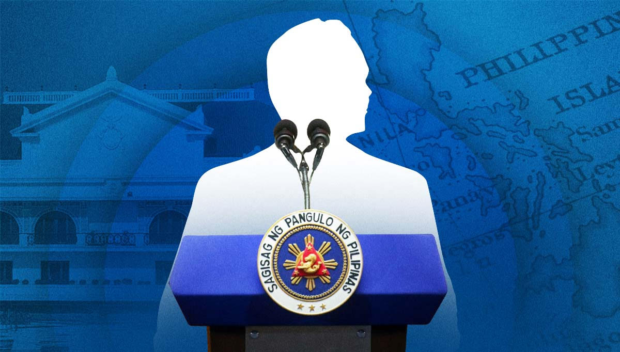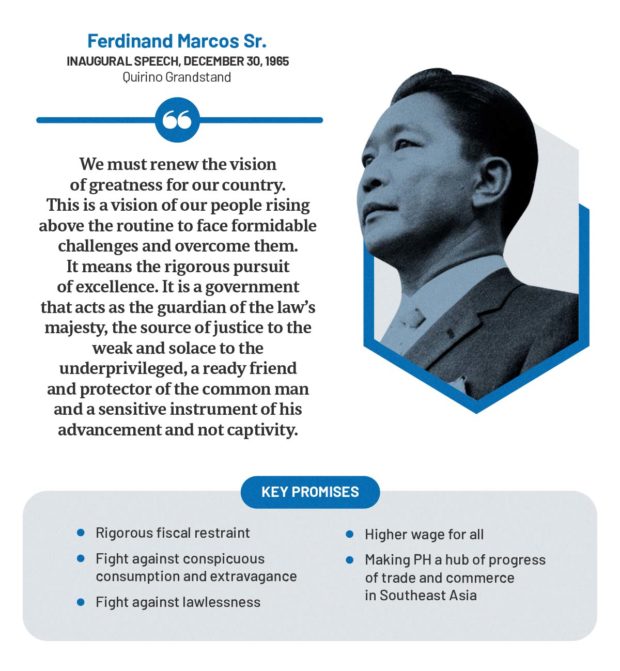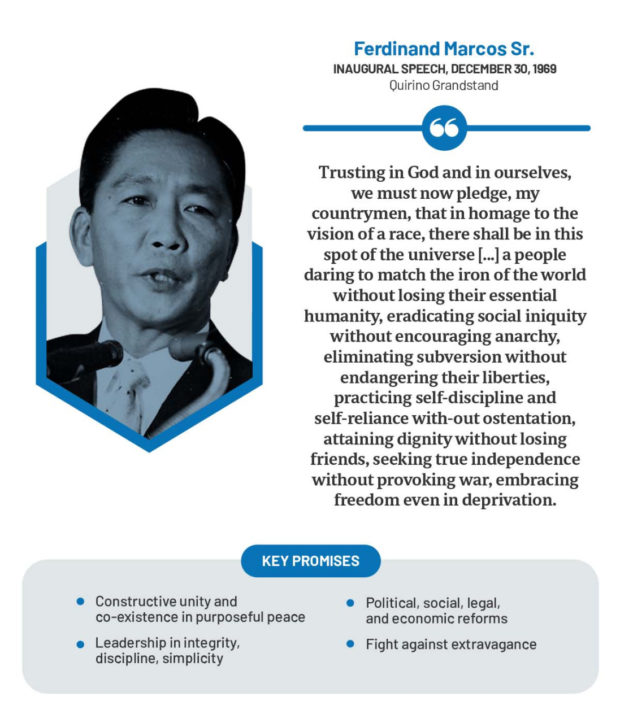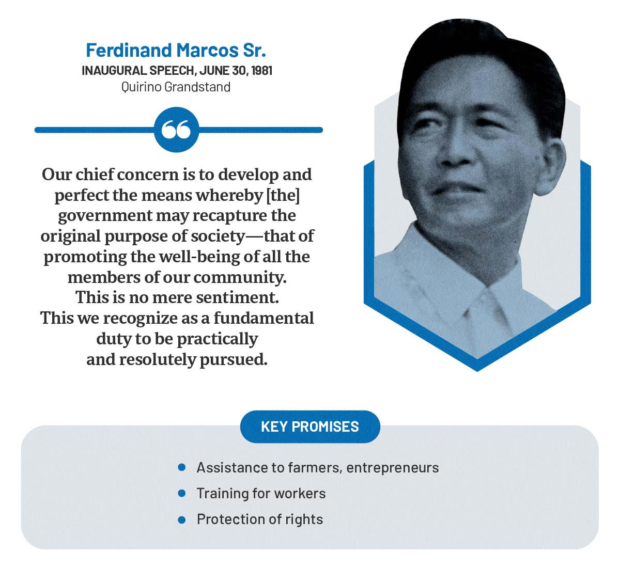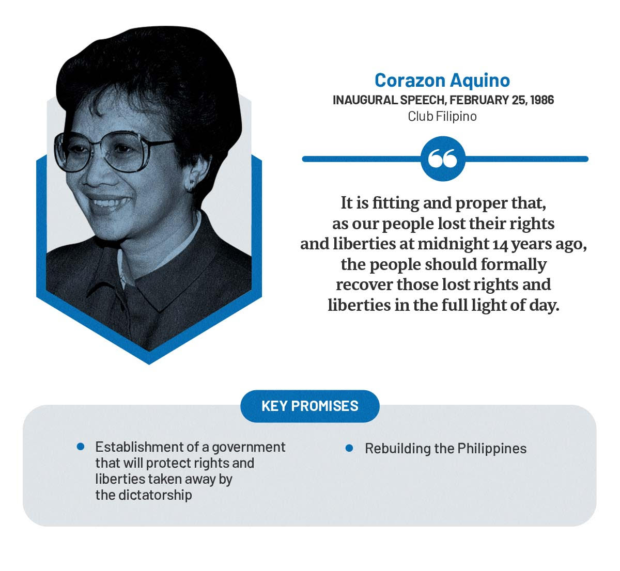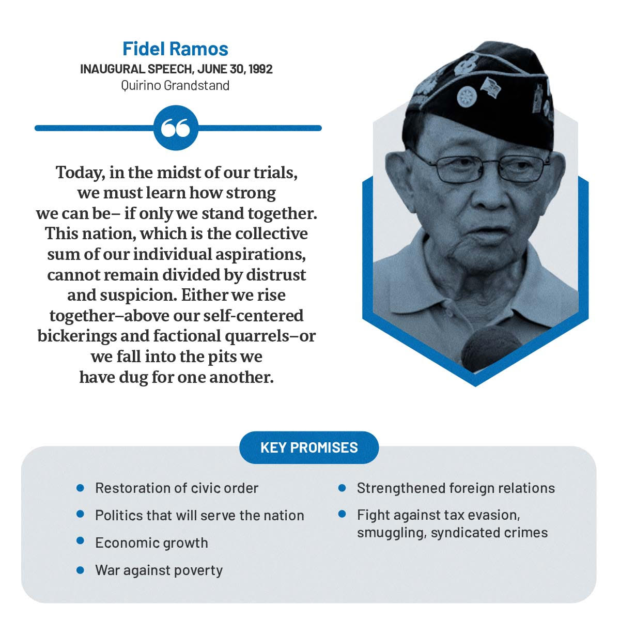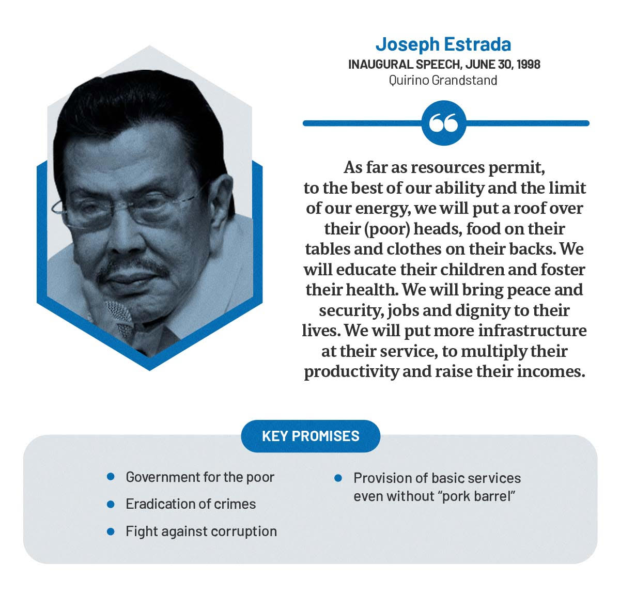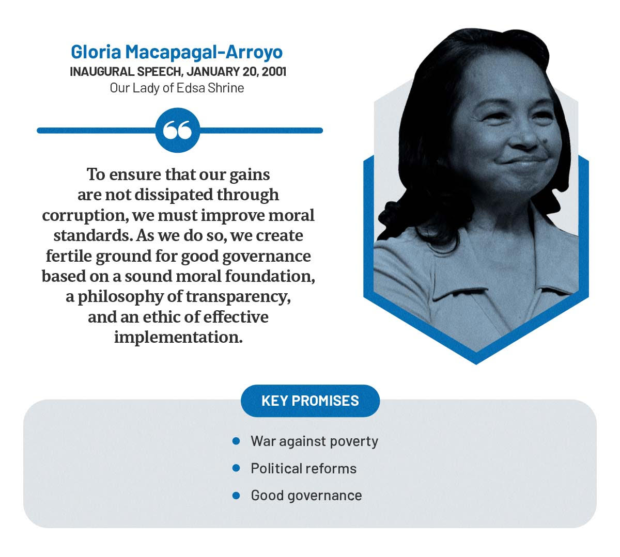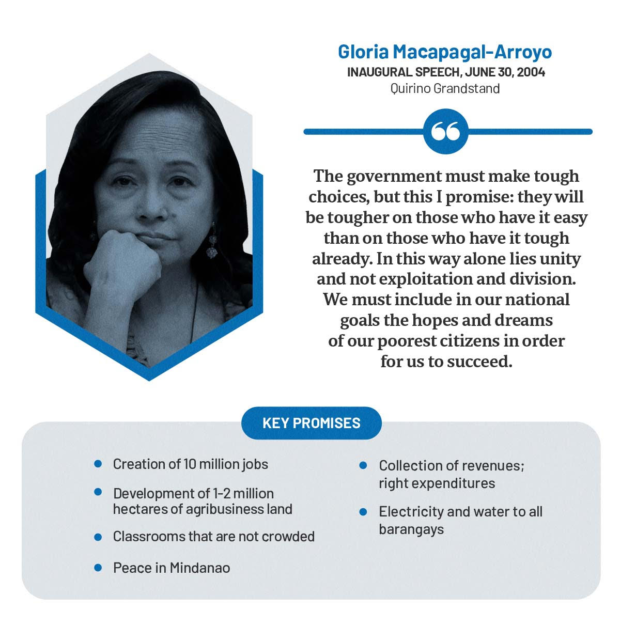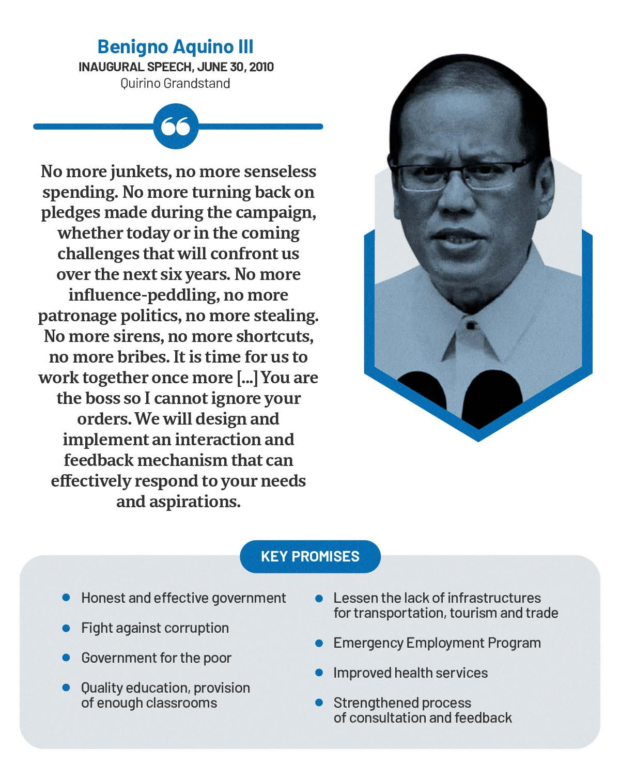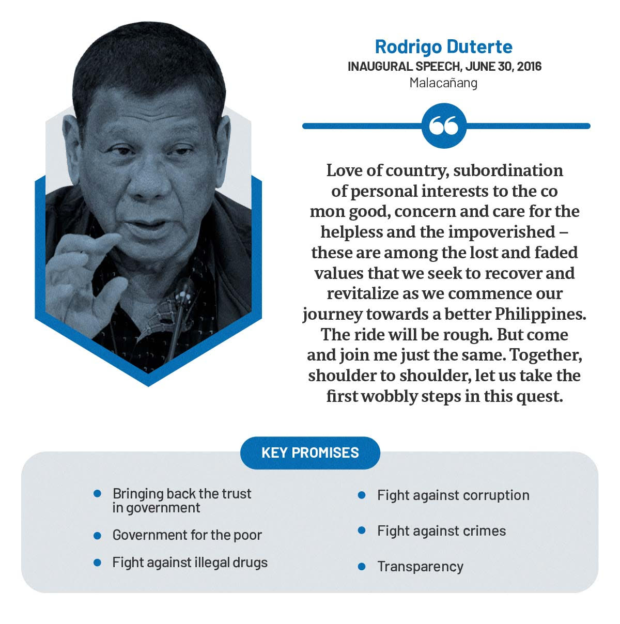Presidential inaugural addresses: What happened to the promises?
MANILA, Philippines—Every time a newly elected president takes his or her oath of office, Filipinos are told of an ideal government as promises of change, end to poverty, economic growth, and provision of basic services take the limelight.
With President Rodrigo Duterte leaving Malacañang next week, all eyes are now on the oath-taking of President-elect Ferdinand Marcos Jr. on June 30 as the Philippines’ 17th chief executive.
RELATED STORY: Watching Bongbong Marcos oath-taking in person? Take public transpo, MMDA suggests
Zenaida Angping, head of the Presidential Management Staff, said the inauguration would take place at the National Museum of the Philippines and that preparations are already in full swing to ensure it will be ready by then.
READ: President-elect Bongbong Marcos to take oath at National Museum
But as Marcos Jr. is set to lead a government that should address the problems confronting Filipinos, aside from how June 30 will be celebrated, all ears are likewise on what he has to say when he gives his inaugural address.
RELATED STORY: Presidential inaugurations: Traditions, rituals, trivia
For Sen. Risa Hontiveros, almost all Filipinos are looking forward to what the administration of Marcos Jr. has to offer and how it will be different from Duterte’s, which saw government debt hitting the P12.68 trillion mark last March.
Article continues after this advertisementProf. Maria Ela Atienza, of the University of the Philippines’ Department of Political Science, told INQUIRER.net that the inaugural address is important as “it sets the tone of the entire six-year presidency.”
Article continues after this advertisement“The president is expected to provide a vision about how he wants to take the country forward. People should use that speech as a way of evaluating his administration’s progress and end-of-term assessment,” she said.
Atienza stressed that Marcos Jr. is expected to provide more details of his plans “beyond his motherhood statements and broad calls for unity,” saying that he should present clear plans about the COVID-19 crisis and economic recovery.
“However, this might be a tall order for him since he was able to win the majority of the votes even without providing a clear program of government as well as substance and deep knowledge of the country’s people and major problems,” she said.
As Filipinos await the day Marcos Jr. takes his oath as President, the office held by his father, the late dictator Ferdinand Marcos Sr. for over 20 years, INQUIRER.net looks back at past inaugurations, the key promises made and if those were realized.
- Ferdinand Marcos Sr.: “This nation can be great again.”
Marcos Sr., who was president from 1965 to 1986, had four (4) inaugural addresses—one in 1965, one in 1969 and two in 1981. All were delivered at the Quirino Grandstand in Manila, except for the last one, which was given in Malacañang.
The first address, which was delivered on Dec. 30, 1965, centered on the commitment to “renew the vision of greatness for our country”—a vision of the people rising above the routine to face formidable challenges and overcome them.
“It is a government that acts as the guardian of the law’s majesty, the source of justice to the weak and solace to the underprivileged, a ready friend and protector of the common man and a sensitive instrument of his advancement and not captivity.”
As the nation’s economic viability needed immediate retrenchment then, he said that “we shall install without any delay a policy of rigorous fiscal restraint.”
“Every form of waste—or of conspicuous consumption and extravagance, shall be condemned as inimical to public welfare,” he said while stressing the need to conserve government resources. “High public officials must themselves set the example.”
Marcos Sr. likewise pledged the immediate establishment of a “genuine rule of law,” saying that “we shall use the fullest powers of the Presidency to stop smuggling and lawlessness.”
“This nation can be great again,” he said while sharing that his vision was to make the Philippines the “hub of progress—of trade and commerce in Southeast Asia.” “This is a vision that all of you share for our country’s future.”
“Neither wealth nor power will purchase privilege; wealth and power shall not outrage the conscience of our people” was the message of his second inaugural address, which was delivered on Dec. 30, 1969.
He said then that Filipinos will become a people “daring to match the iron of the world without losing their essential humanity, eradicating social iniquity without encouraging anarchy, eliminating subversion without endangering their liberties.”
Filipinos, he said, “will practice self-discipline and self-reliance without ostentation, attain dignity without losing friends, seek true independence without provoking war, embrace freedom even in deprivation.”
Marcos Sr. promised then the severest test of leadership in integrity and discipline, saying that public officials shall set the vision for simplicity and that extravagance will be considered an offense that could be reason for dismissal from office.
“Today with us, self-reliance is no longer an option; it is our fate. The next few years will lay the basis for a revolutionary reformation of our international and domestic policies—of our political, social, legal and economic systems,” he said.
Marcos Sr., who had been elected in 1965 and 1968, was expected to yield the presidency in 1973, an election year under the 1935 Constitution. However, a new Constitution was set in place and martial law was declared.
This was the reason that while his presidency was only limited to eight years, as prescribed by the 1935 Constitution, he governed the Philippines for over 20 years. He delivered two inaugural addresses on June 30, 1986.
The lack of self-discipline was the main message of his third address, with him saying that “for so long, we have [been] immersed in a confused debate over ideas and principles, when our real need was self-discipline.”
“Our chief concern is to develop and perfect the means whereby [the] government may recapture the original purpose of society—that of promoting the well-being of all the members of our community.”
“This is no mere sentiment. This we recognize as a fundamental duty to be practically and resolutely pursued,” he said while stressing that Filipinos’ rights shall not only exist on paper, but in effective processes.
He delivered his fifth inaugural address on Feb. 25, 1986 in Malacañang, while Corazon Aquino, the widow of Sen. Benigno Aquino Jr., likewise took her oath as chief executive. Marcos Sr. was later ousted from office through the Edsa People Power.
While there were years—1973 and 1976—when the Philippines’ gross domestic product (GDP) hit 8.92 percent and 8.81 percent, Marcos Sr.’s regime likewise saw the GDP contract to negative 7.32 percent and negative 7.04 percent in 1984 and 1985.
The Martial Law Museum (MLM) said “poverty worsened” throughout the dictatorship—six out of 10 families were poor by the time Marcos Sr. went to exile, an increase from the four out of 10 families before he took office in 1965.
READ: Marcos’ martial law: Golden age for corruption, abuses
Rights violations likewise tainted his regime. The Human Rights Violations Victims’ Memorial Commission said there were already 11,103 “approved” compensation claims—some were for those killed, tortured, imprisoned, and who went missing.
As Marcos Sr. was ousted through a bloodless revolution, the World Bank and the United Nations Office on Drugs and Crimes said he had stolen between $5 billion and $10 billion from the country’s resources.
- Corazon Aquino: “We are free again.”
Aquino, who ran against Marcos Sr. in the snap elections of 1986, delivered a short inaugural address in San Juan City’s Club Filipino on Feb. 25, 1986, with a promise “to offer all that I can do to serve you.”
As the dictatorship left a country torn by rights violations, she said: “It is fitting and proper that, as our people lost their rights and liberties at midnight 14 years ago, the people should formally recover those lost rights and liberties in the full light of day.”
The main message of Aquino’s address highlighted how “people power” shattered the dictatorship, protected those in the military that chose freedom, and established a government dedicated to protect and fulfill Filipinos’ rights and liberties.
Aquino inherited an external debt of $28.26 billion in 1986. The MLM said it was only $0.36 billion in 1961. Moreover, farmers were only receiving a daily wage of P23 in 1974, right after the declaration of martial law.
“Now, by God’s grace and the power of the people, we are free again,” she said while asking those “who have not yet joined us” to stop engaging in any action against the people and instead lend a hand in rebuilding the country.
She ended her six-year term on June 30, 1992, the same day that Fidel Ramos, the Department of National Defense secretary and the one Aquino endorsed for the presidency, took his oath as the next president of the land.
Aquino, who is considered worldwide an “icon of democracy,” faced several coup d’état attempts. While her administration was credited with the framing of the 1987 Constitution, her six-year presidency was still tainted with rights violations.
Back in 2017, then Rep. Ariel Casilao (Anakpawis) said the victims of rights violations, like the 13 farmers who were killed in a land reform protest in Mendiola, Manila, should be compensated as well.
Likewise, a 1992 New York Times article said that even Aquino’s former officials stressed that “her indecisiveness and failure to engage the most pressing economic problems facing the country delayed, and maybe doomed, the economic revolution.”
It stated that 65 percent of the population of almost 70 million Filipinos then still lived below the poverty line, only a slight improvement since Marcos Sr. was forced out in 1986.
- Fidel Ramos: “Win the future.”
Ramos, Marcos Sr.’s vice chief of the Armed Forces of the Philippines, who later became a key personality in the people power that ousted the dictator in 1986, took his oath as president six years after Cory Aquino’s term.
He delivered his inaugural address on June 30, 1992 at the Quirino Grandstand in Manila, with the message of dedicating his presidency to the empowerment of Filipinos, “not only in their political rights but also in economic opportunities.”
“Today, in the midst of our trials, we must learn how strong we can be–if only we stand together. This nation, which is the collective sum of our individual aspirations, cannot remain divided by distrust and suspicion,” he said.
“Either we rise together–above our self-centered bickerings and factional quarrels–or we fall into the pits we have dug for one another,” Ramos said while stressing that “redemption is in our hands.”
Ramos’ address highlighted the need to make hard decisions, saying that “we shall have to resort to remedies close to surgery—to swift and decisive reform.” The first thing that should be done, he said, is to restore civic order.
“For without stability, businesses cannot run, workers cannot create wealth, liberty cannot flourish, and even individual life will be brutish and precarious,” he said as he stressed that “politics should serve the nation, not self interests.”
One of his key promises was economic growth by getting the entire economy to generate productive employment, keeping in mind that for each Filipino, a job means not only material income—it is social usefulness and self-respect.
“We cannot dream of development while our homes and factories are in darkness. Nor can we exhort enterprise to effort as long as [the] government stands as a brake–and not as a spur–to progress,” he said.
To end poverty, he stressed that his administration will confront graft and corruption with actual results rather than words: “We will go after the bribe-takers and the bribe-givers. The bigger the target, the greater will be the government’s effort.”
He likewise promised strengthened foreign relations by striving to boost ties with old friends and trading partners and developing new friendships: “Diplomacy for development will be our central foreign policy thrust.”
Lastly, Ramos committed zero tolerance of tax evasion, smuggling and syndicated crimes—no matter how highly placed those who commit it. He said “it is by collective action that we will realize the highest of our hopes and dreams.”
A study for the World Bank, “The Political Economy of Reform under the Ramos Administration,” stated that the confidence generated from local and international players and analysts resulted from wide-ranging reforms rooted primarily in a sound macroeconomic and investor-friendly regime as well as global competitiveness.
In 1995, Ramos said that the gross national product grew by 5.5 percent, which the government considered a signal that economic recovery was complete. It projected that by the year 2000, the Philippines would become one of the “tiger economies” in Asia.
However, that same year, a Social Weather Stations survey, as cited by the group Social Watch, revealed that 70 percent, or 49 million Filipinos, considered themselves poor.
Based on data from the Philippine Statistics Authority, almost six million families were part of the lowest 40 percent income group in October 1998. Sixty percent, or 8.62 million, were in the highest income bracket.
- Joseph Estrada: “A government for the poor.”
With the slogan “Erap for the poor,” Estrada won the presidential election of 1998. His address, delivered at the Quirino Grandstand in Manila, started with a message that “it is a day of the Filipino masses, one of their own is finally leading them.”
Estrada, vice president from 1992 to 1998, said his government would “prioritize the common people,” stressing that “it is time for the masses to enjoy ‘first priority’ in the programs of the government.”
“As far as resources permit, to the best of our ability and the limit of our energy, we will put a roof over their (poor) heads, food on their tables and clothes on their backs. We will educate their children and foster their health.”
“We will bring peace and security, jobs and dignity to their lives. We will put more infrastructure at their service, to multiply their productivity and raise their incomes,” he said.
Estrada, who had been a successful action star and local politician in San Juan, likewise promised an end to criminality, saying there is no criminal organization or criminal activity that can stand up to the government if the government is sincere about stamping it out.
“Government can provide basic services without the extra cost of pork barrel or kickback; roads for work; infrastructure for productivity; schools for skills; clinics for health; police for safety, and a lean and mean military machine for national defense.”
Under him as president, he said there will be no tolerance in government for graft and corruption. However, in 2001, he was ousted from Malacañang when millions of Filipinos gathered on Edsa to condemn corruption under his administration.
He was later charged with four counts of corruption, involving diversion of funds worth P4 billion, Reuters reported. In 2007, he was found guilty and was sentenced to life in prison, but Gloria Macapagal-Arroyo granted him pardon.
- Gloria Macapagal-Arroyo: “Improve moral standards.”
Arroyo, who succeeded Estrada when he was ousted in 2001, delivered her inaugural address at the Our Lady of Edsa Shrine in Mandaluyong City on Jan. 20, 2001, saying that “people power” has dramatized the Filipino’s capacity for greatness.
“To ensure that our gains are not dissipated through corruption, we must improve moral standards. As we do so, we create fertile ground for good governance based on a sound moral foundation, a philosophy of transparency, and an ethic of effective implementation.”
She was once again elected to Malacañang in 2004, making her presidency (nine years) the second-longest, next to Marcos Sr. She then took oath as president on June 30 that year at the Quirino Grandstand in Manila.
Arroyo’s message was clear: “The government must make tough choices, but this I promise: they will be tougher on those who have it easy than on those who have it tough already.”
“In this way alone lies unity and not exploitation and division. We must include in our national goals the hopes and dreams of our poorest citizens in order for us to succeed,” she said.
Her vision was detailed: the creation of 10 million jobs, development of one to two million hectares of agribusiness land, no more crowded classrooms, electricity and water in all villages, and peace in Mindanao.
However, in mid-2010, months since she stepped down from Malacañang, the Department of Education identified a shortage of 66,800 classrooms. In January of that year, resources were set in place to address the shortage.
Likewise, the think tank Ibon Foundation said the Arroyo administration “will be remembered for lost ground on important measures of development and progress in the face of economic growth.”
“Filipinos are worse off today than when President Gloria Macapagal-Arroyo came to power nine years ago,” it said while stressing that joblessness was at record highs, household real income declined, poverty increased, and inequality worsened.
It said that the period 2001-2009 is the longest period of high unemployment in the country’s history, with the actual joblessness rate averaging some 11.2 percent. From 3.1 million in 2001, it grew to 11.4 million in 2010.
- Benigno Aquino III: “You are my boss.”
Aquino III, who carried the slogan “Daang Matuwid (Straight Path)” in the presidential election campaign of 2010, delivered his inaugural address at the Quirino Grandstand in Manila on June 30 of the same year.
His message then was clear: “You are my boss.” He stressed that “today marks the end of a regime indifferent to the appeals of the people [and] it is not Noynoy who found a way.”
“You are the reason why the silent suffering of the nation is about to end. This is the beginning of my burden, but if many of us will bear the cross we will lift it, no matter how heavy it is,” he said.
READ: Noynoy Aquino’s rule: Numbers tell part of the story
“Through good governance in the coming years, we will lessen our problems. The destiny of the Filipino will return to its rightful place, and as each year passes, the Filipino’s problems will continue to lessen with the assurance of progress in their lives.”
Aside from the promise of an honest and effective government that will serve the poor and the youth, Aquino III vowed to fight corruption, improve health services, ease joblessness, and strengthen the consultation and feedback process.
“No more junkets, no more senseless spending. No more turning back on pledges made during the campaign, whether today or in the coming challenges that will confront us over the next six years. No more influence-peddling, no more patronage politics, no more stealing,” he said.
“No more sirens, no more shortcuts, no more bribes. It is time for us to work together once more […] You are the boss so I cannot ignore your orders. We will design and implement an interaction and feedback mechanism that can effectively respond to your needs and aspirations.”
In his six-year presidency, the Philippine economy had its time in the spotlight with numbers not seen before as the country’s GDP growth averaged 6.2 percent yearly. In 2016, a few months before he stepped down, economic growth was 6.9 percent.
While ending corruption was one of his key promises, the numbers showed that the policy against corruption was faltering in implementation. The anti-graft court Sandigandayan said from 2010 to 2016, the number of cases that had been disposed of was barely 20 percent of total.
Regarding the war on poverty, the Ibon Foundation said that despite the almost P300 billion being spent on the Pamilyang Pantawid Pilipino program (4Ps) from 2011-2016, the number of Filipinos in extreme poverty is still the same—27 million as of the first half of 2015.
“More than two of 3 Filipinos live on just P125 or less per day which has become more difficult with the increasing cost of basic goods and services from food to transportation, education and health,” it said.
- Rodrigo Duterte: “All is not lost.”
A long-time mayor of Davao City, Duterte, with the promise of change, won the presidential election of 2016 with over 16 million votes. He took his oath of office in Malacañang on June 30 of the same year.
Duterte’s message highlighted that democratic governments draw strength from the people: “That is why we have to listen to the murmurings of the people, feel their pulse, supply their needs and fortify their faith and trust in us whom they elected to public office.”
He said all is not lost, stressing that he will work on restoring the people’s trust. “Erosion of faith and trust in government–that is the real problem that confronts us.”
“Love of country, subordination of personal interests to the common good, concern and care for the helpless and the impoverished—these are among the lost and faded values that we seek to recover and revitalize as we commence our journey towards a better Philippines.”
“The ride will be rough. But come and join me just the same. Together, shoulder to shoulder, let us take the first wobbly steps in this quest,” he said.
Duterte, known for his iron fist policy against crime, stressed that “there are those who do not approve of my methods of fighting criminality, the sale and use of illegal drugs and corruption.” In response, he said he has seen how corruption and criminality destroyed the country.
He said he detests secrecy, so he will advocate transparency in all government contracts, projects and business transactions from submission of proposals to negotiation to perfection and finally, to consummation.
Pulse Asia, in September 2016, said 79 percent of Filipinos approved of Duterte’s efforts against corruption, way higher than Aquino III’s 56 percent in March 2011 and Macapagal-Arroyo’s 32 percent in October 2004.
RELATED STORY: In oozing praise of Duterte as ‘best president,’ Bato didn’t show numbers
The Philippines, in the last four years, had an average rating of 34 out of 100 in Transparency International’s Corruption Perception Index, with 1 being the highest ranking:
- 2017: 34 points (rank 111)
- 2018: 36 points (rank 99)
- 2019: 34 points (rank 113)
- 2020: 34 points (rank 115)
Last year, Duterte, who once declared he won’t condone even a “whiff” of corruption, has been drawn to saying “you cannot stop corruption” by what he and his explainers said was the sheer enormity of the problem.
Likewise, his State of Assets, Liabilities and Net Worths has not been made public since 2018.
RELATED STORY: Public and SALNs: Not just a fixation
His war against criminality was likewise tainted with rights violations. In one instance, he said, “I don’t care about human rights, believe me.”
The Philippine Drug Enforcement Agency said that as of April 30 this year that a total of 6,248 individuals have been killed in the government’s war on illegal drugs. Estimates made by human rights groups, however, placed the number of deaths at 30,000.
